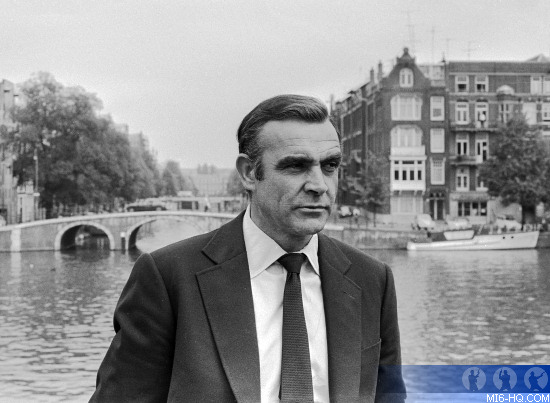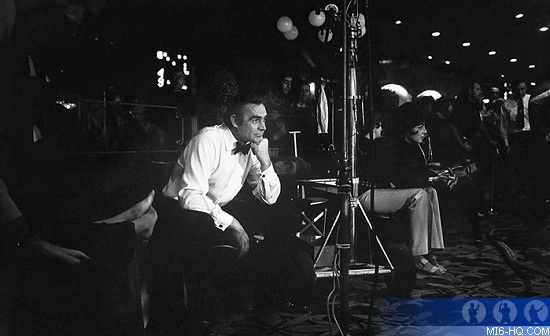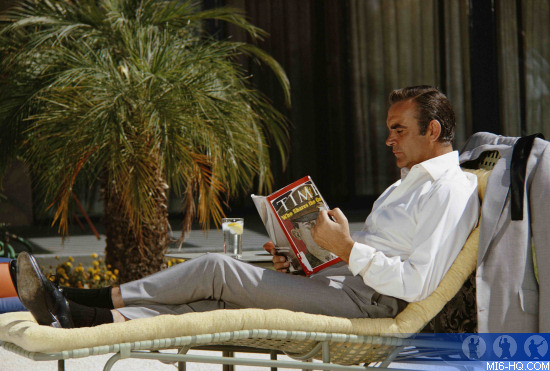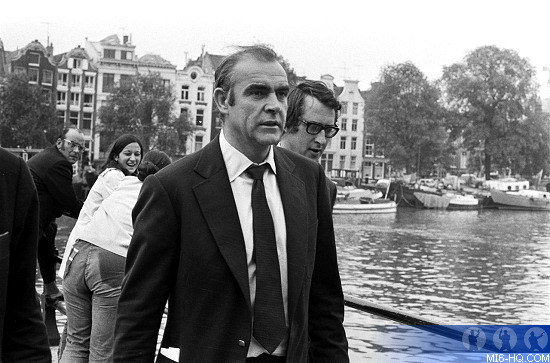Back In Bondage
28th December 2015
On this day in 1971, Sean Connery gave a candid interview to The Guardian about coming back to the 007 role
 By MI6 Staff
By MI6 Staff
"Back In Bondage" - Tuesday 28th December 1971 (The Guardian, Tom Hutchinson)
Sean Connery ordered a Perrier water because he had been drinking heavily the night before and, mortal, had not been able to make a James Bond-like with one leap he was free escape from the clutches of the resulting hangover. He watched the elegant back of Kenneth Tynan disappearing into the further recesses of the restaurant. "K-k-kenneth (sic) f-f-fucking T-t-tynan," he mimicked. "Spends his life criticising plays from a position of lofty principle and then dives into a show like "Oh, Calcutta!" which isn't half so well presented as Raymond's Revuebar where I was the other night. Even though the Revuebar champagne is so bloody pricey...
"I'll give Tynan one thing, though: I was once at a party and he was there and there was this fight between two men over a girl and he helped separate the men and do you know what he said? 'Stop behaving like people,' he said. He must have been waiting all his life for a situation where he could make a remark like that."

"Poor Lazenby couldn't do [it] because he just didn't have the experience. I know he behaved like a prize shit." - Sean Connery
He ordered a dozen oysters and consumed them with the avid rapidity of a man who is now aged forty-one and knows he needs the vitamins to make him feel human again. For the actor who has so often assumed the myth of snobbish thuggery that is Bond he is very human indeed: he does not evade or avoid; talks with a fine growl of voice that, when relaxed, occasionally lapses into the dour vowels inherited from a working-class background in the tougher areas of Edinburgh (milkman, lorry driver, cement mixer, bricklayer, steel bender, coffin-polisher, and other grinding etceteras). He uses four-letter words like a dramatic technician: to freeze what you might pass off as a casual remark into a statement of import.
His new Bond film, "Diamonds Are Forever," is to be released on Thursday (Odeon, Leicester Square) and he had, he said, been put through the necessary mill of interviews to promote that event. "At least you converse. Usually I hate interviews because I end up boring myself listening to me talking all the time." He managed, though, to talk without self-inflicting too much pain.
His love-hate affair with the character of Bond began ten years ago, when producers Harry Saltzman and Cubby Broccoli signed him up for "Dr No." He is not exactly in sympathy with the character ("I've only read two Bond books; I found Ian Fleming himself much more interesting than his writing"), but realises that without Bond he would not be the rich man he is today. He is a director of a Pall Mall bank and was able to donate a lot of the money to his self-founded Scottish International Educational Trust from the deal he made on "Diamonds Are Forever."
The role of Bond was taken over for the last film, "On Her Majesty's Secret Service," by George Lazenby, an actor whose most eloquent claim to previous fame was as Big Fry in the TV commercial. The result was a Big Drag. The lure that trapped Connery back again in the part was the chance to produce two further films of his own choice for United Artists, a large percentage of the profits and a start-stop clause in his contract which meant that if shooting over-ran 18 weeks he would be paid $10,000 a week. The film finished on time.

"It can be done, you see, if there's money at stake. I'd been frigged about too much on other Bond pictures. There's so much bullshit that comes from bad decisions being made at the top. I admire efficiency: like watching a good racehorse or the way Picasso works: where everything functions perfectly within its capacity. But talking to some of these moguls about it is like trying to describe to someone who has never taken exercise what it is like to feel fit when you do exercise. They don't understand."
He is notably overt in his opinions of producers Saltzman and Broccoli ("for every good idea Harry has had he's gone on to eight flops") and said: "They're not exactly enamoured of each other. Probably because they're both sitting on fifty million dollars or pounds and looking across the desk at each other and thinking: that bugger's got half of what should be all mine."
He is fascinated, though, by the movie tycoonery of the past inhabited by such awesome citizens as Zanuck, Mayer, Jack L. Warner. "The trouble is that they became so remote their decisions could never be genuinely questioned, unless it was by men who were tougher than they were. Do you know that that film producer in the book 'The Godfather' has the head of his best racehorse cut off by the Mafia? That incident is supposed to be true and the producer is alleged to be based on Jack Warner."
He was happy at the recollection of how he had himself "screwed Jack Warner for $50,000," when "A Fine Madness" over-ran its shooting schedule. Efficiency certainly counts for a lot with Sean Connery: the grime of a poverty-stricken childhood is still under the fingernails of his present success.

"Of course the films will go on, but who'll play me I just don't know." - Sean Connery
He admires an actor such as Sir Ralph Richardson because "an audience is never safe with him, you don't know what he's going to do next? But, although he has acted and produced in the West End he can barely conceal his contempt for the RADA voice and attitude. His voice prance in imitation before he said, "Because I'm Scottish I stress certain words differently. The Scots, for instance, say: how are
"Because of my word-stress I was able to get away from the original Bond character and take the sting out of those bad-taste jokes that crop up in the films. The first director, Terence Young, and I worked hard on the character to get in some humor: it certainly isn't in the books I've read. Poor Lazenby couldn't do that because he just didn't have the experience, even though the director, Peter Hunt, was quoted as saying that he has taught Lazenby all I knew. And in three months! Lazenby couldn't do a good job because you have to have technique to get the character right. I know he behaved like a prize shit, alienating people from what they tell me - I've never met him - but it wasn't all his fault."
He revealed his lack of Bond's culinary conceit by saying he couldn't remember what lobster thermidor was, settled for cold lobster instead, and maintained yet again that "Diamonds Are Forever" would be the last Bond film he would ever make. "Of course the films will go on, but who'll play me I just don't know and can't guess." I asked how he thought "Diamonds Are Forever" would make out at the box office? How would the sixties hero make out in the seventies with a public more aware of the realities of a secret agent's life since John Le Carre chilled the image. "There's room for both kinds of hero. Bond is an escape-character and people will always demand escape."
The first of the two films he will personally produce has no ejector seat to help audiences flee from brutalities. It will be called "Something Like The Truth," adapted by John Hopkins from his stage play about a policeman interrogating, finally killing, a child rapist. Connery will play the policeman. The second film? "I don't know yet. I've written a screenplay of "Macbeth" but I'm hanging on to it until I see what Polanski's version is like." His first film will be directed by Sidney Lumet with whom Connery worked on "The Hill" and "The Anderson Tapes."
"We'll make it for under a million dollars because Sidney is that kind of efficient director. Both films I did with him came under schedule. The kind of films I want to make will mean that people who make the most sacrifices will make the most money." Like the technicians? I suggested. "Like me and the director," he said.

The machine that is his livelihood is, as with all actors, himself. And he views himself with objective efficiency. "I try not to drink too much because when I do drink I drink too much and too easily. I gave up smoking three years ago' a complete cut-off; when I smoked pot I found that I didn't like it because, although it turned me on all right, it was too much like smoking cigarettes. I dehydrate very easily in high temperatures. I didn't know this until I was in Japan and found that I was slowing down without realising it. They had to pump a pint of saline into me. When I was making "The Molly Maguires" the doctors had to give me tea with a whole lemon squeezed into it and salt crackers. That worked, too."
He split a matchstick in two, so that he could ease the lobster remnants out from the crevices between his teeth: another gesture of making do with the materials at hand; and essential, inherent efficiency. He was stirred, but not shaken when asked about his private life. Separated from the actress-writer Diane Cilento he has two children - a 14 year-old daughter and a 9-year old son - who visit him when they are home from school. He fetches them personally from the station, instead of sending a chauffeur, "because they are important to me." A lot of things are, I feel, but not Bond.
Connery has always seemed meshed into the myth of that character: it is something that the man who played a significant Hotspur some years ago both resents and is philosophical about. But then we were talking about Scottish comedians and I said that they rarely seemed to become national figures: their comedy seemed confined to beyond the Border and it was a subject obviously clear to dear to his heart. "It's true: you're right. People I love like Jimmy Logan just don't seem to 'travel' or if they do, like Andy Stewart, they lose something of their identity. Chic Murray... now there's a great comedian.
He began to imitate Murray, stiffening the words into the dialect: "I was walking out of the house the other day, putting my left foot in front of my right because that's the usual way I walk. And I saw my auntie and I said 'Hello, dear.' I always call her dear because she's got antlers." And he laughed and pulled out a cigar and asked for a cigar-cutter, but smoked it with the band still on it, which is something Bond would never have done. But Sean Connery, of course, has experiences and done things that Bond could never have achieved. So that he comes through as more of a man's man than Bond. More vulnerable, perhaps, than the image projected in "Diamonds Are Forever": but tougher, much tougher. And you sense in that long journey from down-at-heel there have been a lot of fractures on the way.






